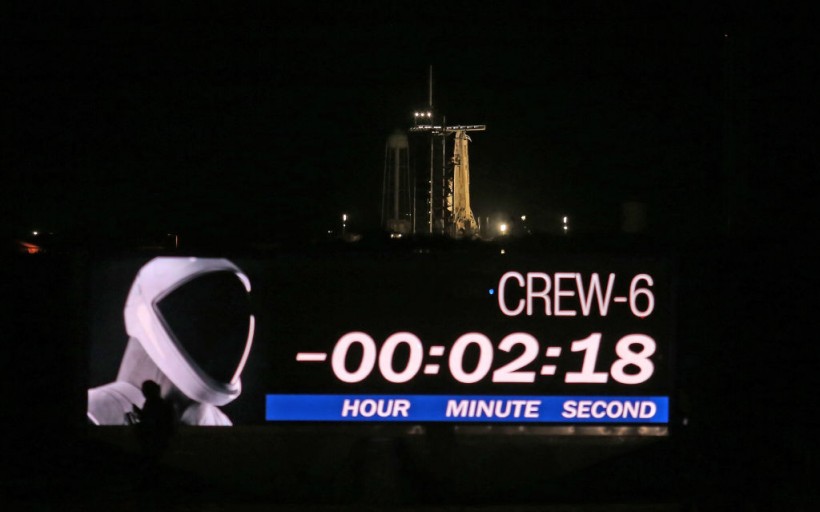The launch of a SpaceX Falcon 9 rocket to the International Space Station (ISS) was postponed on Monday, February 27, due to ground system issues, NASA reports.

The SpaceX Falcon 9 rocket and Dragon spacecraft Endeavour sit poised on Launch Pad 39A as the countdown was scrubbed on February 27, 2023, due to a technical issue at Kennedy Space Center in Cape Canaveral, Florida.
Postponed at the Last Two-Minute Mark
The SpaceX Dragon Crew-6 mission, carrying two NASA astronauts, a Russian cosmonaut, and the second Emirati to travel to space, was set to launch from Florida's Kennedy Space Center at 1:45 a.m. (0645 GMT). The American space agency posted on Twitter that the mission was called off two minutes before liftoff due to ground systems issues.
Launch Update: Today's #Crew6 launch has been scrubbed due to an issue with ground systems. Stand by for details on a new launch date and time. https://t.co/149FPqMrnu pic.twitter.com/1PSYsjCGpL
— NASA (@NASA) February 27, 2023
According to ARS Technica, the space agency's webcast host initially revealed the problem with the TEA-TEB igniter fluid around five minutes before the scheduled liftoff time. The technical issue was not resolved by mission operators before the immediate launch window started.
Triethylaluminum (TEA) and triethylborane (TEB) are combined to form TEA-TEB (TEB). These are two distinct metal elements, each bonded to three hydrocarbon atoms. These molecules are bonded together by weak, easily broken links, which is why it spontaneously combusts when TEA-TEB comes into contact with oxygen.
SpaceX systems engineer Kate Tice said in a webcast commentary on Monday that the decision to cancel the launch was taken "out of an abundance of caution."
New Schedule for Crew-6 Launch
All members of the Crew-6 mission were safe on board the Crew Dragon spacecraft, and they disembarked shortly after SpaceX began unloading fuel from the rocket, CNN reports. The launch is said to be rescheduled for a later date.
There is a backup opportunity for the mission on Tuesday, February 28. Nevertheless, while the weather was perfect on Monday morning, it may be less so on Tuesday.
Weather at the launch site should be good, but forecasters are concerned about the weather along the rocket's path, which might come into play if the launch is aborted and Crew Dragon needs to return to Earth in an emergency. NASA and SpaceX can launch the Crew Dragon mission on March 2, 3, and 4.
NASA astronauts Stephen Bowen and Warren Hoburg, Roscosmos cosmonaut Andrey Fedyaev, and UAE's Sultan al-Neyadi will be aboard the orbiting station for six months.
Neyadi, 41, will be the fourth Arab astronaut to travel to space and the second from the oil-rich UAE; his colleague Hazzaa al-Mansoori conducted an eight-day mission in 2019. He describes the planned expedition as a "huge honor." Meanwhile, Hoburg, the Endeavour pilot, and Fedyaev, the Russian mission specialist, will fly into space for the first time.
The mission is anticipated to be SpaceX's eighth astronaut journey on NASA's behalf since 2020. It comes when astronauts at the ISS are dealing with a transportation dilemma.
Since the Russian invasion of Ukraine pitted Moscow and Washington against each other, space has remained a unique platform for collaboration.
RELATED ARTICLE: SpaceX Falcon 9 Rocket Created a Bizarre Blue Spiral That Appeared in the Night Sky Over Hawaii
Check out more news and information on SpaceX in Science Times.














